A newslanc special feature
FORWARD:
Hoping to remove Attorney General Kathleen Kane from office and to silence her without a hearing, the leadership of the Pennsylvania Senate has invoked a 140-year-old constitutional provision called “Direct Address.”
Even though top members of the Republican party planned the Direct Address removal of Kane for more than a year, they had no idea that the provision had ever been used before, unsuccessfully — in 1891.
In 1891:
PART ONE:
His Excellency, the Governor of Pennsylvania, Robert Pattison, rides the train from Philadelphia into Harrisburg the night before, accompanied by his trusted Attorney General, William Hensel. They disembark and closet themselves into the attorney general’s office at the old Capitol Building.
In the morning, Gov. Pattison and AG Hensel loudly launch their long-promised institutional attack on entrenched political corruption in Pennsylvania.
In expectation, “political sharps” are riding in from all corners of the state, to oppose or side with crusading young Gov. Pattison.
By 1891 Gov. Pattison and AG Hensel had worked with each other for almost a decade.
Hensel, a publisher of the Lancaster Intelligencer daily newspaper, managed Pattison’s first successful election as governor in 1882.
Pattison, a minister’s son and at the time only 31 years old, became the youngest man ever elected governor of Pennsylvania. He was the only Democrat elected governor in the 75 years between the Civil War and the Great Depression. So it was quite a feat.
In 1890 Pattison sought his second, non-consecutive term as governor, and Hensel was again at Pattison’s side on the campaign trail, railing against entrenched Republican corruption in the state.
Hensel, in 1890, “opened (Pattison’s reelection) campaign at Reading in a speech which first called public attention to the unconstitutionality of the Republican candidate’s (misuse of state funds),” relates the Encyclopaedia of Contemporary Biography of Pennsylvania (Atlantic Publishing 1898). “He accompanied Mr. Pattison on his State tour and spoke in many places, elaborating his argument against State Treasury abuses. His speeches were carefully prepared legal arguments, quite out of the line of the ordinary stump speech…. Immediately after (Gov. Pattison’s) inauguration the name of Mr. Hensel was sent to the Senate by Governor Pattison, and he was unanimously confirmed at once (as attorney general).”
Throughout the early months of his second term and into the summer of 1891, Gov. Pattison and AG Hensel shamed the Republican-dominated legislature into appointing a Joint Investigative Committee to examine long-festering allegations of corruption in the state treasury — something the Republicans were not too keen to do.
In October 1891, a few weeks out from the November elections, Gov. Pattison and A.G. Hensel lowered the boom. They called the Senate in to an “Extraordinary Session” to remove from office the Republican state Treasurer Henry Boyer, and Auditor General Thomas McCamant.
Gov. Pattison and AG Hensel accused the two row officers of having corrupt ties with the recently retired Philadelphia city treasurer, John Bardsley, and looking the other way as taxes due the state went uncollected.
To remove the state treasurer and auditor general from office, Gov. Pattison and AG Hensel invoke the Direct Address removal clause that had been added to the state constitution seventeen years earlier, in 1874.
Gov. Pattison was well acquainted with the Direct Address removal procedure. In his first term, in 1885, Gov. Pattison had overseen the Direct Address removal from office of an ailing Pittsburgh judge, John Kirkpatrick.
Now, he and AG Hensel attempt to use the Direct Address provision to go after the Republican state treasurer and auditor general.
But they wouldn’t stop there.
The night before the Extraordinary Session is convened, Gov. Pattison and AG Hensel issue a proclamation further demanding the Senate apply the Direct Address provision to remove nine or ten corrupt Philadelphia magistrates and constables, in addition to the state treasurer and auditor general.
They were going after an entire network of corrupt, and untouchable, state officials.
This would be the same provision the Pennsylvania Senate would misuse some 125 years later against AG Kathleen Kane.
When they invoked the Direct Address procedure against Kane in 2015, Senate political leaders had — unbelievably — no idea that the provision had been used before, or to what effect, or why.
And today’s Senate leaders certainly aren’t interested in going after the entire network of officials caught up in the pornographic email scandal that AG Kane brought to light. They are instead misusing the Direct Address provision to silence Kane.
But there’s a rich history behind Gov. Pattison’s failed 1891 Direct Address attempt. It was the biggest political story of the day, and ran for more than a month.
The best account of Gov. Pattison’s 1891 Direct Address attempt are contained in the pages of the Pittsburg Dispatch, the popular newspaper of the day.
As a public service, newslanc.com is republishing those Dispatch accounts below. You can read our transcriptions, or download the Dispatch.
This, then, is a live blog from 1891:
October 12, 1891
(download Pittsburg Dispatch page here>)
Pattison’s Latest
The Governor Issues Still Another Vigorous Proclamation, Which
Demands a Clean Sweep
Attention Called to the Fact That Many Quaker City Magistrates and Constables
Are Charged With Conspiracy
To assist (Philadelphia Treasurer) Bardsley in Defrauding the State, and Have Paid Bribes to the Defaulting Ex-Treasurer.
The Senate Asked to Investigate
And Find if Sufficient Cause Exists for the Removal of These Officials, Along With Bayer and McCamant
To-day the Joint Committee Will Report
[From a staff correspondent]
Harrisburg, Oct. 12 — Another bombshell was exploded to-night when Governor Pattison issued the following proclamation, which explains itself:
Harrisburg October 12.
In the name and by the authority of the Commonwealth of Pennsylvania, Executive Department.
Proclamation.
Whereas, It is alleged and believed that many of the magistrates of courts not of record, of police and civil causes, in Philadelphia, have been faithless and dishonest in the performance of their official duties:
Whereas, It is further alleged and believed that many of said magistrates, together with the constables attached to their courts, have been participants in a conspiracy to cheat and defraud the Commonwealth of Pennsylvania in connection with the collection of delinquent mercantile license taxes in the city and county of Philadelphia, by which large sums of money have been lost to the Commonwealth.
Guilty of Bribing John Bardsley
Whereas, It is also alleged and believed that many of said magistrates and constables have been guilty of bribery by payment of money to John Bardsley, late Treasurer of the city and county of Philadelphia, in order to influence the official actions of said John Bardsley and others for the purpose of obtaining control and jurisdiction of the suits against delinquent dealers in Philadelphia, it being alleged and believed that the sum of $350 was paid by each magistrate before when such suits were brought in the year 1889 and in the year 1890 to the said John Bardsley, for the personal use and private gain of himself and others;
Whereas, In the year 1889 the sum of $31,811.85 was paid to Israel W. Durham, Horatio B. Hackett, William H. List, James F. Neall, Johnson Roney, Benton O. Severn, Robert R. Smith, Thomas W. South, and John T. Thomspon, magistrates of Philadelphia, as magistrates’ and constables’ costs in suits against delinquent dealers in Philadelphia, from which suits no collections whatever were made for the use of the Commonwealth: and in the year 1890 the sum of $24,114.29 was paid to William Ahern, Israel W. Durham, Horatio B. Hackett, James F. Neall, Ambrose P. Pullinger, Thomas Randall, Johnson Roney, Robert R. Smith, and Thomas W. South, magistrates of Philadelphia, as magistrates’ and constables’ costs on the suits against the delinquent dealers in Philadelphia, from which no collections whatever were made for the use of the Commonwealth.
Whereas, a thorough and careful inquiry by the Senate may establish that “reasonable cause” exists for the removal of many of said magistrates and constables, said officials falling within the operation of Article 6, Section 4, of the Constitution which provides that all “officers elected by the people, except governor, lieutenant governor, members of the general assembly and judges of the court of record, learned in the law, shall be removed by the governor for reasonable cause after due notice and full hearing, on the address of two thirds of the Senate.”
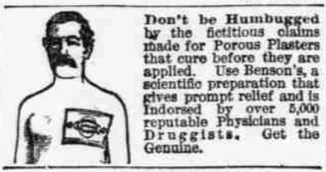 Now, therefore, I, Robert E. Pattison Governor of the said Commonwealth of Pennsylvania, having already convened the Senate of the Commonwealth of Pennsylvania to meet in extraordinary session on Tuesday the 13th day of October 1891 for the purpose of inquiring whether there is “reasonable cause” for the removal of the Auditor General and State Treasurer, do also convene the said Senate of the Commonwealth of Pennsylvania to meet as aforesaid for the additional purpose of considering whether “reasonable cause” exists for the removal of any of the magistrates and constables of Philadelphia.
Now, therefore, I, Robert E. Pattison Governor of the said Commonwealth of Pennsylvania, having already convened the Senate of the Commonwealth of Pennsylvania to meet in extraordinary session on Tuesday the 13th day of October 1891 for the purpose of inquiring whether there is “reasonable cause” for the removal of the Auditor General and State Treasurer, do also convene the said Senate of the Commonwealth of Pennsylvania to meet as aforesaid for the additional purpose of considering whether “reasonable cause” exists for the removal of any of the magistrates and constables of Philadelphia.
Given under my hand and the great seal of the State, at the city of Harrisburg, this 12th day of October, in the year of our Lord 1891, and of the Commonwealth the one hundred and sixteenth. Robert Pattison.
By the governor.
William F Harrity, Secretary of the Commonwealth
The Committee at the Capital.
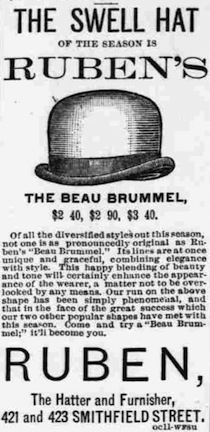 The Legislative Committee came to the city tonight on the same train as Governor Pattison, but during the ride from Philadelphia the work was not referred to. The committee met to-night in the Senate chamber, and for three hours the intellectual athletes of both parties struggled in a wrestling match without a positive fall on either side. When the committee assembled a large crowd gathered about it. Attorney General (William Uhler) Hensel occupied a seat on the Democratic side of the chamber. Deputy Attorney General Stranahan sat in the seat adjoining, and between the two were seated papers and publications bearing on the investigation.
The Legislative Committee came to the city tonight on the same train as Governor Pattison, but during the ride from Philadelphia the work was not referred to. The committee met to-night in the Senate chamber, and for three hours the intellectual athletes of both parties struggled in a wrestling match without a positive fall on either side. When the committee assembled a large crowd gathered about it. Attorney General (William Uhler) Hensel occupied a seat on the Democratic side of the chamber. Deputy Attorney General Stranahan sat in the seat adjoining, and between the two were seated papers and publications bearing on the investigation.
George Handy Smith, Chairman of the Investigating Committee, sat at the chief clerk’s desk. The seat occupied by Mr. Smith during the last session of the Senate was used tonight as the witness box. Rufus Shapley, Philadelphia attorney, sat with the witnesses. Senator Flinn, of Pittsburg, set next to Shapely. Senator Neeb touched elbows with Flinn. Between the two the Republican Party and its interests where carefully watched, and it might be added, suffered little in the contest.
Ready With a Partial Report.
At midnight the committee went into executive session, during which they appointed Senator Flinn and Representative Stewart, of Allegheny, and Mr. Fow of Philadelphia, a sub-committee to prepare and submit to the governor this morning a partial report covering the work done by the committee. The sub-committee will, with an unbiased introduction, submit to Governor Pattison the testimony adduced by the legislative committee, and the governor will in turn submit it to the Senate when it meets at noon to-morrow. The admissions of both Boyer and Mccamant will be called attention to by the governor in his message, and the removal from office will be asked on the strength of their own testimony.
The meeting to-night clearly indicated the leaders of both parties during the extra section of the senate. Hensel, Ross, Herring and Fow will do all the work for the Democrats and Flinn and Neeb, of Allegheny, and Thompson, of Dauphin, with the aid of their attorney, Shapely, of Philadelphia, will look after the interests of the Republicans.
This city is rapidly filling up with political sharps, and every county in the state is now represented here by their best political talent. No one is prepared to indicate, however the policy to be followed by either party when the Senate meets, but from all indications there is sufficient reason for the conclusion that it will be a struggle in which party and legal lines will be closely drawn.
Besides the Senators there are here enough members of the House to make a quorum. Should an extraordinary session of the Legislature be deemed advisable they could be convening in an hour. Herbert.

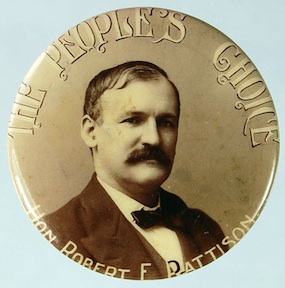
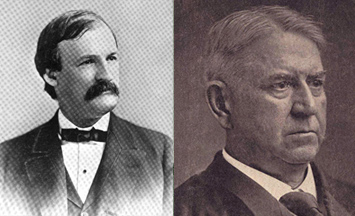
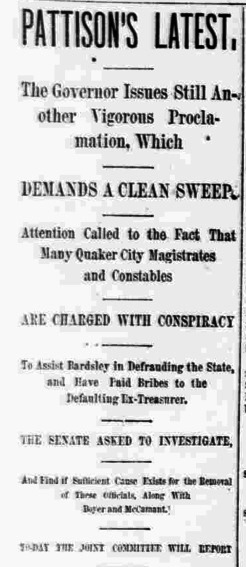
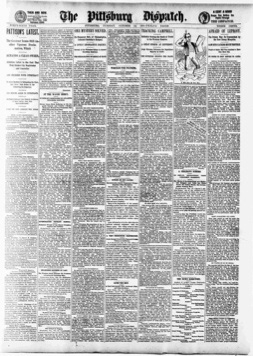

Superb investigative journalism!
Kane is entitled to a trial. Perhaps the GOP “political sharps” realize that an early impeachment trial is incompatible with Kane’s anticipated criminal trial, in either or both of which Kane would be able to actually defend herself.
And now we have Deputy Attorney General Bruce Beemer an unelected holdover Republican appointee in the AG’s opining that Kane had no authority to name a Special Prosecutor to investigate the so called “Porngate” scandal which is seminal to this entire affair. Curiously, he expressed that view in a letter to one Sen. Lisa Baker, who has no legal background and is merely a member of the committee that has recommended the “Direct Address” procedure, which also deprives Kane of her right to defend herself.
Perhaps the proceeding should be conducted in Salem, MA, which seems a more appropriate venue for this type of proceeding.
Gov. Wolfe is in a tough spot here because larger issues require he work with the GOP majority in the Senate.
Those who fail to study history are certainly doomed to repeat it!
Totally awesome report. Stunning about the truth of this broken PA government?